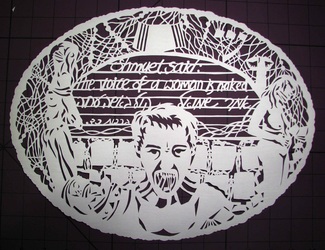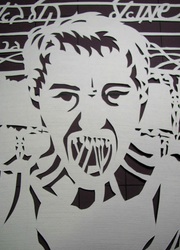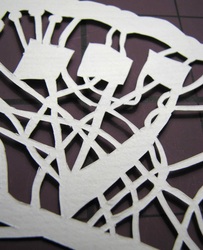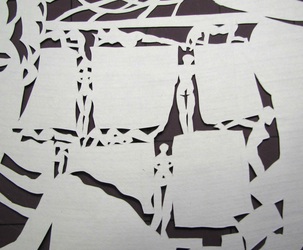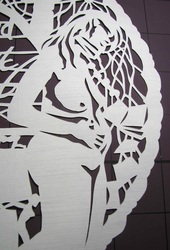Silence!
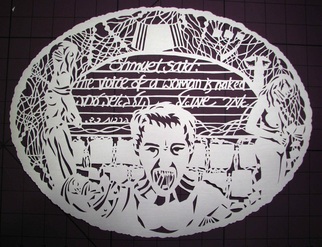
“Shmuel said: the voice of a woman is naked” (Babylonian Talmud Brachot 24a)
In October 2012 Anat Hoffman and other women were harassed at the Western Wall, the Kotel, for praying loudly, specifically the prayer ‘shema’ and wearing a tallit (prayer shawl). They were arrested for creating a public disturbance at this place of prayer. In Jewish law, women’s voices are considered a distraction for men. This statement by Shmuel in the Talmud describes a woman’s voice as ‘ervah’ - the term given to erotic naked parts of the body which are not appropriate for public display. Ervah is often translated as ‘nakedness.’ I have translated it sightly differently as I prefer the raw power inherent in the word ‘naked.’
At the Kotel prayers and requests written on paper are left in cracks in-between the bricks. In this paper-cut there are silhouettes of naked women amongst the bricks. In the margins there are tangled tzitzit and a tallit, and bound and gagged women. The women are silenced and restricted. But at the centre of the paper-cut is an angry woman with the word ‘Shema’ in her mouth. The word ‘shema’ means ‘listen.’ Women struggle to have their voices heard in public spaces, both in Israel and around the Jewish world.
article about the arrest of the women in oct 2012,
my blogpost about this arrest, and other examples of silencing women in the jewish world
In October 2012 Anat Hoffman and other women were harassed at the Western Wall, the Kotel, for praying loudly, specifically the prayer ‘shema’ and wearing a tallit (prayer shawl). They were arrested for creating a public disturbance at this place of prayer. In Jewish law, women’s voices are considered a distraction for men. This statement by Shmuel in the Talmud describes a woman’s voice as ‘ervah’ - the term given to erotic naked parts of the body which are not appropriate for public display. Ervah is often translated as ‘nakedness.’ I have translated it sightly differently as I prefer the raw power inherent in the word ‘naked.’
At the Kotel prayers and requests written on paper are left in cracks in-between the bricks. In this paper-cut there are silhouettes of naked women amongst the bricks. In the margins there are tangled tzitzit and a tallit, and bound and gagged women. The women are silenced and restricted. But at the centre of the paper-cut is an angry woman with the word ‘Shema’ in her mouth. The word ‘shema’ means ‘listen.’ Women struggle to have their voices heard in public spaces, both in Israel and around the Jewish world.
article about the arrest of the women in oct 2012,
my blogpost about this arrest, and other examples of silencing women in the jewish world
